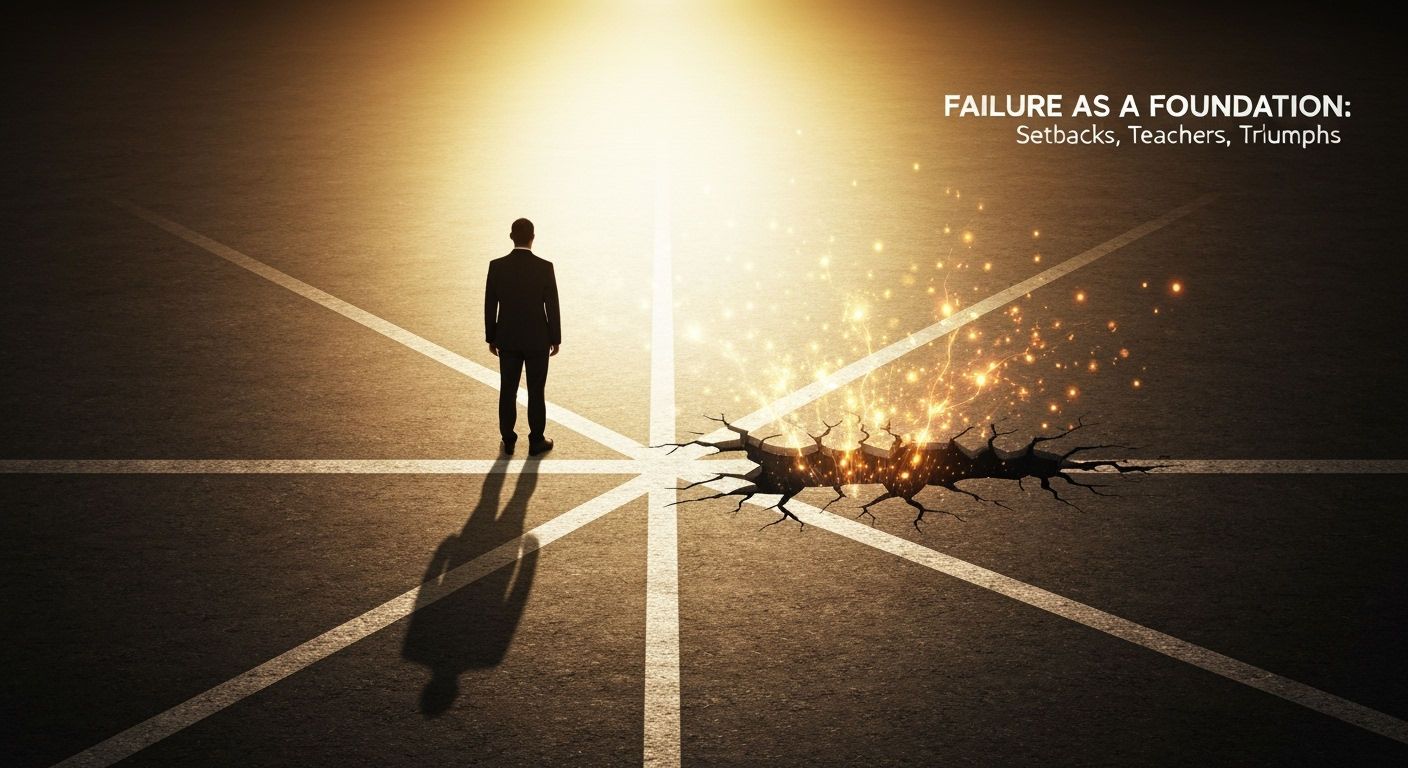Failure as a Foundation: Setbacks, Teachers, Triumphs
<
It’s easy to look at successful businesses, especially in the tech world, and see a linear path to glory. You know, like one big, smooth climb to the top. But let me tell you, from my seat as the CEO of IndiaNIC, that picture is usually missing a few crucial details: the stumbles, the falls, and yes, the spectacular face-plants. We’ve had our fair share of those, and honestly? They’ve been our best teachers.
For years, I’ve navigated the waters of innovation and entrepreneurship. What I’ve learned isn't from the projects that went perfectly, but from the ones that didn't. The ones that tested our resolve, our strategies, and sometimes, even our sanity. This isn't just about business; it’s about life. Every 'failure' isn't a dead end, it’s a detour with a lesson plan.
Think about it. When everything goes right, you rarely stop to dissect 'why.' You just keep moving. But when something goes wrong? Oh, then you pull out the magnifying glass, the whiteboard, and maybe even a few extra cups of chai (چائے). That’s where the real learning happens. That’s where foundations are strengthened. This is our story, and perhaps, yours too.

Learning from the Stumble
Early on, when IndiaNIC was just finding its feet, I was full of youthful exuberance and, frankly, a bit too much confidence. I believed every idea was a winner, every client a guaranteed success. That was, until reality decided to give me a firm tap on the shoulder—more like a full-blown shove, actually. It taught me humility, fast.
Story time: Back in the day, we landed a massive project with a client based out of Houston. I was so convinced of our approach, I pushed our team to follow a very rigid development path, ignoring some early warning signs. We delivered, but the client wasn't thrilled. The product, while technically sound, didn't quite hit their market need. It was a huge setback, financially and emotionally. We had to go back to the drawing board, losing time and resources. But that experience taught me the invaluable lesson of listening, truly listening, to client feedback and adapting.
"Success is a lousy teacher. It seduces smart people into thinking they can't lose." – Bill Gates
You know, in the startup world, they say 'fail fast, fail often.' I used to think that was just a cool slogan. Now I understand it's a survival strategy. It’s not about embracing failure for failure’s sake, but about learning to extract every ounce of wisdom from it. It’s about being agile enough to pivot before you crash and burn. How do you approach setbacks in your own journey?
The Pivot Power
Sometimes, what feels like a total disaster is actually an invitation to innovate. It forces you to look at things from a fresh perspective, to challenge assumptions you didn't even know you had. This 'pivot power' is crucial in a fast-changing industry like ours.
Team experience: I remember a project where our team, led by Mihir from Ahmedabad, was developing a complex e-commerce platform. We were deep into it when the client’s market research revealed a significant shift in user behavior. Our initial design was suddenly, well, a bit outdated. Mihir and his team didn't panic. Instead, they took a step back, held intense brainstorming sessions, and completely re-architected a core module. It delayed us, sure, but the end product was far superior and perfectly aligned with the new market demands. Their resilience was inspiring.
We often joke in our team: "Why did the developer go broke? Because he used up all his cache (cash)!" It's a lighthearted way to remind ourselves that resources are finite, and every decision, especially after a setback, needs to be well-considered. That project taught us the importance of iterative development and constant communication. It wasn't about being 'wrong' initially, but about being 'right' eventually.
Has there ever been a moment in your career where a major redirection led to a much better outcome? Tell me about it!
Embrace the 'Oops!'
Creating a culture where it’s okay to make mistakes, as long as you learn from them, is vital. It’s not about blame; it’s about growth. We try to foster an environment where 'oops!' is followed by 'what now?' not 'who did this?'
Client success: There was a time with our client, Saeed from Dubai, where a critical integration with a third-party API completely failed during testing, just days before launch. It was a huge 'oops!' moment for everyone. Instead of pointing fingers, our project manager immediately communicated the issue transparently to Saeed, outlining the problem and proposed solutions. Saeed appreciated the honesty and our quick response. We worked through the weekend, fixed the issue, and launched successfully. That transparency, born from learning from past failures, solidified our relationship.
We like to say, "A good programmer is someone who always looks both ways before crossing a one-way street." It’s about foresight, but also about knowing that even with foresight, things can go sideways. The key is how you react. Do you freeze, or do you find a new path forward? What’s your go-to strategy when things unexpectedly go wrong?
Mentors in Mistakes
Every mistake becomes a mentor, whispering lessons you wouldn’t have heard otherwise. It’s about building resilience, both personally and within your team. These are the moments that truly define your character and the character of your organization.
Team experience: Neha from Udaipur, a brilliant UI/UX designer, once presented a design concept to a client that was met with a very lukewarm reception. She was disheartened. But instead of letting it get to her, she proactively scheduled follow-up calls with the client, asked specific questions about their concerns, and dove deep into user research. She came back with a completely revised design that blew them away. She turned a perceived 'failure' into a deep understanding of client needs and a stronger design solution. Her ability to bounce back and learn was truly remarkable.
Client success: Jennifer from Toronto, a long-time client, once challenged us with a feature request that seemed almost impossible given the existing architecture. Our initial assessment was that it would require a complete overhaul. Instead of saying 'no,' we explored alternatives, prototyped different approaches, and eventually found an elegant, albeit unconventional, solution. It pushed our team to think outside the box, and Jennifer was thrilled. That 'impossible' moment became a testament to our problem-solving capabilities, all thanks to not backing down from a potential failure.
Have you ever had a challenge that seemed insurmountable, only to find a creative solution by refusing to give up? Share your 'aha!' moment!
Beyond the Bottom Line
The lessons from failure extend far beyond profit margins and project timelines. They shape you as a leader, as a person. They teach you empathy, patience, and the true meaning of perseverance. For me, these moments have been as impactful as any big success.
Personal reflection: I remember a period when a personal health challenge completely threw my work-life balance out of whack. It wasn't a business failure, but it certainly felt like a personal setback that impacted my ability to lead effectively. It forced me to delegate more, trust my team implicitly, and prioritize my well-being. The business didn't just survive; it thrived because I had built a team capable of stepping up. It taught me that sometimes, stepping back is the greatest step forward.
A client, Marcus from Berlin, once told me, "Sandeep, the only real failure is when you stop trying." It resonated deeply. In business and in life, the journey is rarely a straight line. There will be bumps, detours, and moments where you feel like giving up. But it's in those moments, when you pick yourself up, dust yourself off, and try again, that you truly build something enduring.
What’s one personal setback that, in hindsight, taught you an invaluable lesson you now apply every day?
So, the next time you face a setback, don't just see it as a roadblock. See it as a foundation being laid, brick by painful brick, for something stronger, something more resilient. Embrace the lessons, share the insights, and keep moving forward. Because sometimes, the greatest successes are built on the ashes of what didn't quite work out.
What’s your biggest takeaway from this discussion? Drop a comment below and let's keep the conversation going!









